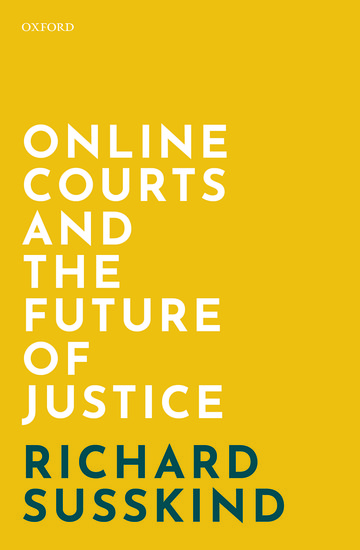Weekend Books – Online Courts and the Future of Justice

Barrister Andrew McKeown critically examines the proposals put forward by legal tech expert Professor Richard Susskind OBE in his latest book.
Online Courts and the Future of Justice is a fascinating read for lawyers and non-lawyers alike. It is clear that Professor Susskind is sincerely interested in the greater access to justice for ordinary people.
The author notes that more people in the world have access to the internet than access to justice. According to the Organisation for Economic Co-operation and Development (OECD), 46 per cent have access to the protection of the law, whereas over 50 per cent live with internet.
Professor Susskind implies that online courts might give greater access to justice, but his ideas give too much power to the State. It is suggested that people don’t really want lawyers, they want a just solution to their problems. Yet he concedes that members of the public are often not familiar enough with the law to recognise that they have reason to take legal advice in the first place.
In his scenario, guidance is still given to litigants, not by independent lawyers sworn to represent only their client’s best interests, but by agents of the State in the form of online case officers. Susskind notes that there may be constitutional difficulties, but he doesn’t fully explore the ramifications of this.
Susskind suggests that litigants would be better able to represent themselves if courts were online. He notes that litigants in person often come into court with indecipherable bundles of papers. Yet, if courts are online, their arguments, which might make a lot of sense in person when actually heard by a judge in court, may not land.
When faced with the issue of ‘hard cases’, he supposes that such cases would be heard, at least at first, in physical courts. He states that the system would identify such cases but doesn’t give an adequate explanation of how this would happen. He argues that the vast majority of cases are heard in the lower courts, and no such issues generally arise.
It must be remembered that Melling v Ó Mathghamhna [1962] IR 1, and other such cases of constitutional importance, first arose in the District Court. Even when such constitutional issues do not arise, the idea that complex cases are not heard in the lower courts is one which no legal practitioner would share.
The reader is left wondering not only of the state of the courts in the future proposed by Professor Susskind, but also of the state of the law as a whole. There is some limited investigation of the place of common law in such a system.
The Irish Courts have showed a willingness to engage with changes in technology. In 2016, the Supreme Court heard Lannigan v Barry, a paperless case. Utilising eCúirt Teoranta, founded by Dáithí Mac Cárthaigh BL and Kieran Morris BL, android-powered tablets took the place of lever-arch folders.
The exact place of technology in our courts, and of our courts in the shifting technological world, remains to be seen.
Online Courts and the Future of Justice by Richard Susskind. Published by Oxford University Press, 368 pp.











